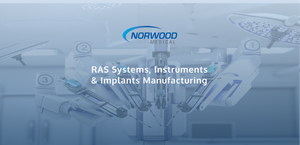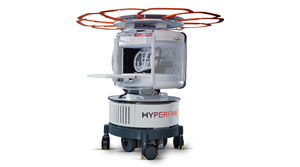The Sunnyvale, CA-based company has long been the top dog in surgical robotics but increased competition is right around the corner for the firm.
April 19, 2019

Intuitive Surgical’s momentum was dulled a bit last week when the surgical robotics company missed Wall Street expectations for 1Q19. The miss caused shares of the Sunnyvale, CA-based company to drop by about 6.2%.
Intuitive’s revenue came in at about $973.7 million for the quarter, with analysts forecasting $980 million in 1Q19 sales. The company also posted earnings of $2.61 per share, on an adjusted basis. Earnings grew 7% but decelerated from 20% growth in the fourth quarter. The earnings also lagged the consensus of analysts polled by analysts for $2.70.
One of the company’s bright spots is the clearance of the da Vinci SP, a single port system that won a nod from FDA in May of last year. During the firm’s earnings call, executives spoke about the strength of the product.
“As we've described in the past, we are also pursuing additional clinical indications for SP and have engaged regulatory agencies regarding their requirements,” Gary Guthart, Intuitive’s CEO said according to a transcript from Seeking Alpha. “The combination of additional indications for SP and production readiness at scale will pace the speed of SP commercial deployment.”
Competition continues to mount against Intuitive in the surgical robotics space. Earlier last week, Johnson & Johnson executives spoke during an earnings call about the company’s surgical robotics offering that is being developing through a joint venture with Verily Lifesciences (Verb).
Ashley McEvoy, Executive Vice President, Worldwide Chairman, Medical Devices, Johnson & Johnson said the company's acquisition of Auris Health, a robotic technologies company, could enhance the platform.
“We view the acquisition of Auris as highly complementary to our Verb program,” McEvoy said according to a Transcript from Seeking Alpha.
Other competitors that are on the horizon include, Caesarea, Israel-based XACT Robotics, which received a CE mark in September to sell its robotic navigation steering system in Europe. The XACT robotics system is currently being used for CT-guided percutaneous procedures in the abdomen
Another company hoping to bring new options to the robotic surgery field is Virtual Incision, which is developing a two-pound robotic device that operates entirely inside the body through a single abdominal incision and is expected to be less expensive and more portable than existing laparoscopic surgery robots. The company is gearing up to seek a 510(k) clearance for its device.
About the Author(s)
You May Also Like




